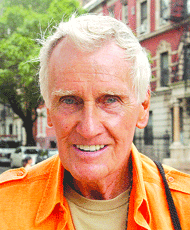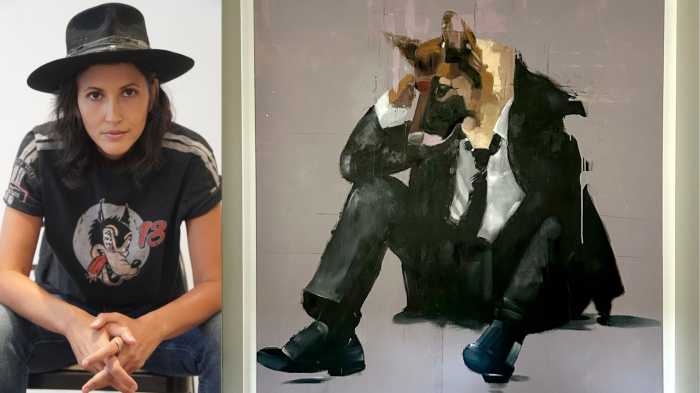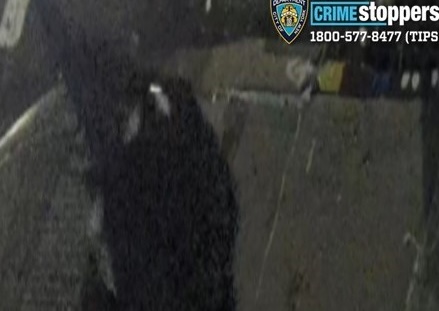By Janet Kwon
With his right leg propped atop a heavily cushioned chair, Bob Kohler shifted his weight from side to side in his wheelchair until he was sufficiently comfortable. He was running a fever of 102 degrees earlier that morning, but he was beginning to feel better — good enough, in fact, to open the window, letting the afternoon sun rays creep into his sixth-floor apartment on Charles St. Having just gotten out of St. Vincent’s hospital after treatment for a severe foot infection that cost him his right big toe, as well as problems with his heart and immune system, Kohler has been mostly housebound — which is very unlike him.
Far from being inactive, Kohler has been an active fighter for gay rights since the 1960s, when he played a large part in founding the Gay Liberation Front, which was born out of the Stonewall riots, where a routine police raid of the popular Greenwich Village gay bar turned into a three-day-long riot when gays, for the first time, fought back.
“The G.L.F. — we did some pretty ballsy things…. We were very fierce and we were very angry, and we didn’t take any s—t from anybody,” Kohler said.
This line is classic Kohler. The Queens native doesn’t take things lying down — and still, at 80 years old, he doesn’t let anything go without a fight, according to those who have worked alongside him.
“He’s always willing to stand up for what he believes is right. It’s an admirable quality that I’ve learned from him,” said activist Eustacia Smith, who’s known Kohler for almost a decade.
“He always confronts people when he thinks they’re doing something oppressive. He comes face to face with it, always willing to see oppression that’s going on and takes part in it,” Smith said.
Smith is a member of ACT UP (AIDS Coalition to Unleash Power) as well as NYCAHN (New York City AIDS Housing Network), both of which Kohler is also a member. In 1999, they worked together on a NYCAHN project demanding that the city provide fair and adequate housing to homeless individuals with AIDS.
It was fall of 1999 when Jennifer Flynn, NYCAHN’s executive director, sent out a mass e-mail calling for volunteers to help fight for the rights of homeless people with AIDS, because the city’s Division of AIDS Services and Income Support was refusing its legal obligation to provide them with adequate emergency housing. She wanted a task force to tackle the challenges of welfare reform.
According to Flynn, about 30 people initially showed up in response to this call for help. However, as the weeks went by, the numbers thinned dramatically — so much so, that only one man was left. He came to the DASIS center on Eighth Ave., and showed up day in and day out for 18 months — without missing a single day.
“I had not done anything like that before, but I was the only one who kept showing up,” Kohler admitted with a slight shrug, wrinkling his crisp white T-shirt. He leaned on the left arm of his wheelchair and explained how the homeless people had qualms about trusting him at first.
“It took a lot of cajoling and begging…they told me to get my white ass out of there,” he said. But they slowly built up their trust in him because “they knew I was going to be there every day and every night,” he continued.
“It was the coldest winter I can remember. I was out there every day for 18 months,” he recalled proudly with a trace of a smile. His smile faded as he described the conditions of the “housing” that was being provided to the homeless with AIDS.
“When we went there, there were no doors on the bathroom stalls, there was no water, phones were broken, it was dirty — it was just unbelievable. I mean, these people weren’t perfect, but they still deserved a bed,” he said.
Kohler recalled one evening around midnight, when a crowd of people was being turned away from the welfare office — left with nowhere to go for the night.
“Chris Quinn came down with her credit card and put the people up in rooms with no questions asked. She really helped us; she was a huge part of our victory. She would just march in there…she’s a tough cookie,” he said with a laugh.
After 18 months of protest, Kohler and NYCAHN brought the issue to the courts, only to have it thrown out two times in a row. The third time was the charm, however, and a major reorganization of the AIDS housing division of the city’s Human Resources Administration was ordered. The office is now located on 14th St. with “big couches and televisions for people to watch while they wait.” People are treated more fairly and with respect, and “the whole thing has changed completely.”
“All we were asking for was that these people be treated like human beings,” he said.
Although Kohler recalls this specific project as the most memorable, with the biggest impact, he said he’s been involved in more demonstrations and protests than he could possibly remember. But what he does remember, with a measure of pride, is that he’s been arrested a total of 32 times, spending his share of days in jail cells.
As a pact among the various groups that he’s served with, a rule of thumb, as a sign of respect and unity, is “solidarity,” which Kohler explains means going through the arrest process with the person charged with the harshest penalty. Unfortunately, Kohler noted, solidarity isn’t observed as much anymore.
“We would get a lot of people who were very green,” he said. “A lot of kids from N.Y.U. who thought that if they just showed up, that was enough. They had no idea what solidarity was, but they’re just being stupid kids, and they don’t really know what they’re doing or why they’re doing it.”
Kohler, as he usually does, had more to share about these confused kids. He thought back to his own teenage years, specifically when he came out at age 16. When he told his parents, he was nonchalant, with a “this is me — take it or leave it” attitude. His mother, Mary Anne, or “Maizie,” took the news very casually, and asked him, “So, what do you want for breakfast?” His father, Raymond, whom he describes as “very German,” didn’t talk about it much, but accepted him as he was.
Kohler emphasized that it was the way he broke the ice that caused his parents to be so understanding.
“These days kids try to challenge their parents and make them feel guilty by coming out on Thanksgiving or Christmas and say, ‘Well, I’ll show them.’ What does that accomplish? The problem comes with how kids present it to their parents,” he said.
In addition to coming-out advice, he gives budding activists these morsels of insight: First, know your enemy, and pick the right enemy. Second, work with people, do solidarity and be there when they need you.
“If they get arrested and you don’t, put your ass outside of Centre St. and stay there 24/7 until those people come out, because when they come out, they haven’t eaten, they’re scruffy, and they want to go home and burn their clothes…. Know the needs of your people,” he advises.
During the Republican National Convention, Kohler could be seen standing outside Pier 57, offering solidarity to the hundreds of arrested protesters inside “Little Guantanamo on the Hudson.”
Before dispensing his last pearl of wisdom, Kohler paused, and leaned in and lowered his voice to a few decibels shy of a whisper.
“Listen to the crazies,” he said. Knowing that such a statement would require further explanation, he readjusted his injured foot to a different spot on the cushion, and continued.
“You have to listen to the crazies,” he repeated. “The things that come out of their mouths sometimes are just unbelievable. You know, in those days when everybody was dying [of AIDS] you just needed something to hang onto, because there was just nothing. You just had to walk down Christopher St. and you saw ghosts on the boardwalk.”
In the early ’80s through the ’90s, Kohler ran a chic men’s clothing store on Christopher St., with a summer version on Fire Island.
The Loft sold fashionable and high-end men’s clothing, Kohler said with visible joy as he reminisced.
“It was a beautiful store, it really was. It was all glass with white tiles…. People came from all over the world. I was pushing young designers…and things would sell out almost immediately. They just bought and bought,” Kohler reminisced.
Even when he was a small businessman, he still couldn’t shake the activist in him.
“I promoted Marky Mark when he was dropping his pants all over the place. And then, I boycotted Marky Mark when he started calling women bitches and was getting very nasty,” he recalled.
Kohler remembers calling Calvin Klein and telling him to come to his store to remove all of “Marky Mark’s stuff.”
“They may be low, but I have my standards,” he joked. “That put me in very good standing with the community, because they really appreciated it.”
Fashion was something that came naturally to Kohler, and he shared opinions on what works and what doesn’t.
“He’s a mount of information and he’s wonderful to listen to. He’s got an opinion about everything,” said Sam Agostino, a longtime friend and neighbor.
Agostino was a loyal customer of the Fire Island location of The Loft, and he found a friend in Kohler through their mutual affection for dogs. Kohler has had a dog for most of his life, with the one he remembers most fondly being Mr. Magoo, a miniature schnauzer he had for 13 years. A small figurine of a schnauzer sits atop Kohler’s fireplace, commemorating Mr. Magoo.
Agostino recalls Kohler marching down Christopher St. with members of FIERCE! (Fabulous Independent Educated Radicals for Community Empowerment) — the gay youth group Kohler mentors — during a rainstorm.
“It made me feel proud to know him. He’s always in the front lines and he’s still in the trenches. He’s very inspirational,” he said.
While Kohler has been homebound, Agostino has been helping him by doing his shopping and visiting him on a regular basis.
“The way he’s handling his recovery is remarkable…. He won’t take help if he can do it himself,” he said with a laugh. Then he added, “It’s incredible really, he doesn’t look 80 and he doesn’t act 80.”
Kohler turned 80 on May 17, and a grand party was thrown in his honor. Since he’s a vegetarian, the whole menu was catered to his liking, and many who have been touched by his passionate activism came out to celebrate, recalled Agostino.
Another neighbor and friend, Frank Crapanzano, also attended the party.
“He’s one of a dying breed. I don’t know what’s going to happen when he’s gone because I never see people with the drive that he has,” Crapanzano said. He also feels strongly that Kohler should be the grand marshal of the Gay Pride March, because “he’s somebody who has been in the front line. He’s not a celebrity, he’s actually done the work. He’s done more from the very beginning, and he’s never walked away from it,” he said.
Kohler hasn’t walked away from it, and being ill won’t make him stop either. While at St. Vincent’s, Kohler said he read up on issues concerning animal rights and animal cruelty. Once his foot heals completely, and his other symptoms subside, he said he wants to get started on a project as soon as he can.
“I have a bit more work to do — I’m not ready to go yet,” he said, smiling.







































